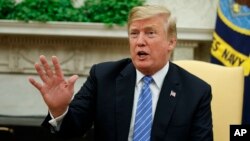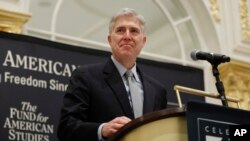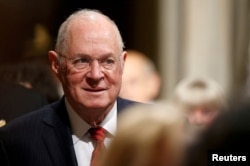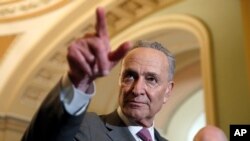U.S. President Donald Trump is interviewing two or three more possible Supreme Court nominees this week after four on Monday before making his selection to fill a pivotal life-time appointment to the country's highest tribunal.
Trump plans to announce his choice next Monday before heading to Europe for NATO meetings and later to London for face-to-face talks with British Prime Minister Theresa May and then Helsinki for a summit with Russian President Vladimir Putin.
Trump described the four federal appellate court judges he met with Monday – reported to be Amy Coney Barrett, Brett Kavanaugh, Raymond Kethledge and Amul Thapar – as "very impressive... incredible people in so many different ways, academically and in every other way."
Among other possibilities, Trump is expected to meet with another appellate court judge, Thomas Hardiman, who news reports say was among the president's finalists last year when he ultimately selected Neil Gorsuch, a conservative appeals court judge who won Senate confirmation and has served on the court for more than a year.
Trump remains undecided on a new choice, White House aides say, and the selection process remains fluid. But some Republicans say that Kavanaugh, who worked in the administration of former Republican President George W. Bush, and Barrett, a former Notre Dame Law School professor, are possible favorites.
White House spokeswoman Sarah Huckabee Sanders declined Tuesday to say who else Trump would be interviewing, but said, "I can tell you that he’s got a great list and we’re excited about who he’s going to pick.”
Trump is choosing from a list of 25 conservative Supreme Court nominees he developed when he was running for the White House and during his presidency to assure his most ardent political supporters that he would pick someone to their liking. If confirmed by the Senate, Trump's selection would become one of the nine justices, replacing long-time Justice Anthony Kennedy, who last week announced his retirement.
Senate Majority Leader Mitch McConnell, who will oversee Republican efforts to win approval for Trump's selection in the politically divided Senate, said Monday of the coming fight over the nomination, "I think there will be a big national, campaign rage. But in the end, I'm confident we'll get the judge confirmed."
Sanders said Trump met with each of the first four candidates for about 45 minutes on Monday. She said Trump is looking for someone who will uphold the U.S. Constitution and who has the "right intellect" and "right temperament."
When asked if Trump is looking for a candidate who will overturn Roe v. Wade, the landmark 1973 Supreme Court ruling legalizing abortion, Sanders reiterated Trump's stance that he is not asking the candidates their views on abortion rights.
"The president is pro-life, but in terms of the process of selecting a Supreme Court nominee, as the president said last week, he is not going to discuss specific cases with the nominees," Sanders said.
Trump said Friday that he thinks the topic of Roe v. Wade is “inappropriate to discuss.”
Trump has also said that his final list of potential Supreme Court nominees includes two women.
On Monday, Senate Minority Leader Chuck Schumer wrote in an opinion column in The New York Times that people should pressure senators to oppose Supreme Court nominees who would overturn abortion rights. Schumer argued that while Democrats are outnumbered by Republicans in the Senate, 51-49, a majority of senators support abortion rights.
A new poll Monday shows that 63 percent of American voters agree with the Roe v. Wade decision, which legalized abortion nationwide. Thirty-one percent of Americans disagree with the ruling, according to the Quinnipiac University National Poll.
The survey also found that 50 percent of Americans think the Supreme Court is mainly motivated by politics, while 42 percent think it is primarily motivated by law. The survey was based on telephone answers from 1,020 voters nationwide from June 27-July 1.
The retirement of Kennedy, the key swing vote between four conservatives and four liberals on the court, gives Trump a coveted opportunity to make a second appointment to the nation’s highest court.
Trump nominated Gorsuch in January 2017. The president said last week that he is looking for another justice who closely models Gorsuch, saying he has been an “outstanding” justice for the Supreme Court.








